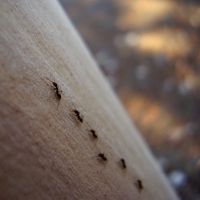Ants in Space? That's a Good Thing

The orbiting International Space Station (ISS) just got 600 or so new visitors who arrived via cargo spacecraft.
They’ll be taking part in a new research project to help determine how they adjust to microgravity conditions, and mapping their behavior could lead to more refined algorithms for solving complex problems—such as how robots could better search for survivors in a burning building or at a disaster scene.
Does the ISS have room for 600 new crew members? In this case, the size of the visitors is not a problem since they’re the common black ants you see on the sidewalk.
Ants in Space is one of the more unique experiments aboard the ISS, but its findings on systems that operate without central control could apply to systems such as the Internet or the immune system as well, according to professor Deborah Gordon of Stanford University, the principal investigator for the project.
As anyone who has battled an infestation in their kitchen or set out food at a picnic can attest, ants have become really good at searching. They march without a leader. And, despite what the song says, they don’t go marching one-by-one; they search collectively. Thanks to 150 million years of evolution, ants know to adjust their search patterns depending on how many ants are part of the search party and the size of the space they’re exploring.
An ant colony monitors its environment to find food, identify threats, or map new terrain. Gordon hypothesizes that by introducing ants to a new environment on the ISS, the microgravity conditions will disrupt their search patterns in a way that compares to, say, the disruption that flames and smoke cause to a radio communicating with a searching robot in a blazing building.
If the ants successfully adapt, software could be developed based on the findings enabling autonomous robots to coordinate searches if their radio systems are being disrupted. This is just one example, but a better understanding of swarm intelligence could solve other complex problems in telecommunications or even airline schedules or truck routing as well.
If you’re interested, there’s a great TED talk by Dr. Deborah Gordon on "The emergent genius of ant colonies" in which she discusses how ants know what to do. And in case you’re wondering, the astronauts don’t have to worry about the ant population increasing in space since only sterile worker ants were sent on this mission.

